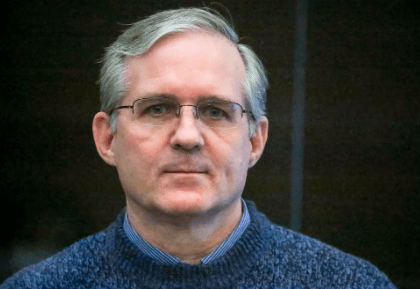
On December 28, 2018, Paul Whelan, a former U.S. Marine, was detained by Russia’s Federal Security Service (FSB) at Moscow’s Metropol Hotel, accused of espionage. His six-year ordeal, which culminated in his release as part of a significant prisoner exchange, highlights the complex geopolitical tensions between Russia and the United States.
The Arrest and Accusations
Whelan, 54, was serving a 16-year sentence in a Russian penal colony on espionage charges. U.S. officials have consistently maintained that he was “wrongfully detained” and targeted because of his American citizenship. Like journalist Evan Gershkovich and other Americans held in Russia, Whelan’s situation was exacerbated by deteriorating Russian-American relations, especially following Russia’s invasion of Ukraine in February 2022 and the subsequent Western sanctions.
A Hostage in a Geopolitical Struggle
To Whelan’s family, he was a hostage amid a larger geopolitical struggle. Russian President Vladimir Putin frames the situation as part of an existential battle for a new world order against the U.S.-led West. Secretary of State Antony Blinken described Whelan’s charges as “sham,” accusing Moscow of inflicting unnecessary suffering on his family. After his detention, the Russian government labeled Whelan a spy, claiming he was caught with a flash drive containing classified information. Whelan has always denied these charges, asserting that he was set up in a sting operation and believed the flash drive contained holiday photos from a friend’s wedding.
Unfair Trial and Conviction
Whelan’s trial, conducted entirely behind closed doors, was deemed unfair and opaque by U.S. diplomats. In 2020, he was convicted of spying and sentenced to 16 years in a maximum-security prison, IK-17, in Mordovia, a region infamous for its penal colonies since Soviet times. John Hardie, deputy director of the Russia program at the Foundation for Defense of Democracies, stated that Whelan’s detention is “symptomatic” of the renewed Cold War dynamics between Russia and the U.S.
Cold War Tactics Reemerge
Leon Aron, a Russia specialist at the American Enterprise Institute, noted that Putin’s government employs Soviet-era tactics by detaining dissidents and non-spies to gain leverage in exchanges. Aron pointed out that these tactics indicate a weakness in Russia’s position, with Putin imitating the Soviet secret police practices where he started his career.
Read also:- Céline Dion’s Stunning Comeback at the Eiffel Tower During the 2024 Olympics Opening Ceremony
Paul Whelan’s Background
Born in Ottawa, Canada, to British parents of Irish origin, Whelan later moved to Novi, Michigan, and holds citizenship in all four countries. He served in the U.S. Marine Corps Reserve from 2003 to 2008, primarily as an administrative clerk in Iraq. His service ended with a bad-conduct discharge for larceny and other offenses. At the time of his arrest, Whelan was the head of global security for BorgWarner, a Michigan-based car parts supplier.
Struggles During Imprisonment
Throughout his nearly six-year imprisonment, Whelan expressed feelings of abandonment by the U.S., especially after he was excluded from two 2022 prisoner exchanges orchestrated by the Biden administration. The first exchange involved former U.S. Marine Trevor Reed for Russian pilot Konstantin Yaroshenko, and the second swapped notorious Russian arms dealer Viktor Bout for basketball star Brittney Griner. Blinken emphasized that the decision was not about choosing one American over another but was a choice between bringing one person home or none.
Whelan endured harsh conditions in prison, including an attack by another inmate. Despite repeated U.S. proposals for his release, Moscow consistently refused, leaving Whelan and his supporters in despair.
Desperate Pleas and Final Release
In a December interview with the BBC, Whelan described U.S. efforts for his release as “throwing spaghetti against the wall to see what sticks,” calling the process a “serious betrayal.” He expressed his frustration with the protracted negotiations, noting the personal toll on his life. Just weeks before his release, Whelan urged President Joe Biden to treat his case with the urgency as if “his own son were being held hostage.”
Despite his frustration, Whelan expressed gratitude for the U.S. officials working on his case, and his family supported the deal for Griner’s return while continuing to advocate for more action on Whelan’s behalf.
Conclusion
Paul Whelan’s detention and eventual release underscore the persistent Cold War echoes in modern geopolitics. His case highlights the complexities and human cost of geopolitical struggles, serving as a stark reminder of the enduring tensions between Russia and the United States.




